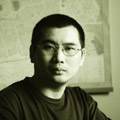From China Media Project, Liu Jiaying and David Bandurski write on a recent conference regarding the rise of Chinese “New Nationalism” (xin guojia zhuyi (新国家主义)) and its impact on journalism within in an already opaque environment. The conference highlights the events of Tibetan protests and the rush of Chinese nationalism prior to the Beijing Olympics in 2008. :
[…] as a younger generation emerges in China with a sense of entitlement and national pride, they are increasingly battling against more liberal voices in China’s media that push for social and political reform. Younger and more educated Chinese, those who have benefitted most from reforms, often resist change to the status quo, and often stridently.
This “new nationalism,” said Xiao, differs from its predecessor, a nationalism promoted by the Communist Party leadership under comprehensive state control. While young Chinese appreciate and benefit from changes in Chinese society, of which commercial media are an important part, they have come to resent calls for more liberal or universal values, such as freedom of speech and democracy, issued by bolder commercial media.
This new nationalism sometimes impedes the state-run media, although as the article points out, still commercial that at times publishes relatively liberal pieces. For instance,
Chang Ping, a columnist and senior editor of Southern Metropolis Weekly wrote an essay in April ’08 titled “How To Find Out the Truth About Lhasa,” and faced an online attack by nationalistic netizens.
As Southern Metropolis Daily buckled under the weight of public opinion, news came that Chang Ping had been removed as deputy editor of Nandu Weekly. While this news was never substantiated — Chang remains with the publication and writes actively today — it reflected the very real pressure this current of “new nationalism” brought to bear not just on Chang’s views on Tibet, but on Southern Metropolis Daily and other commercial media as vehicles for more liberal debate on such issues.
Real News reporter Paul Jay speaks to Minqi Li about Chinese nationalism.
Read also CDT’s stories on the various Olympics protests that happened this year.
The phenomenon of “angry youth” (愤青) to describe the young nationalists can also be found on CDT.








